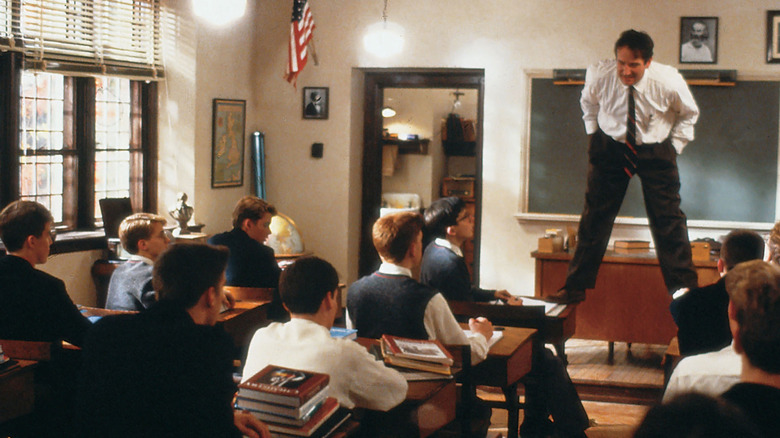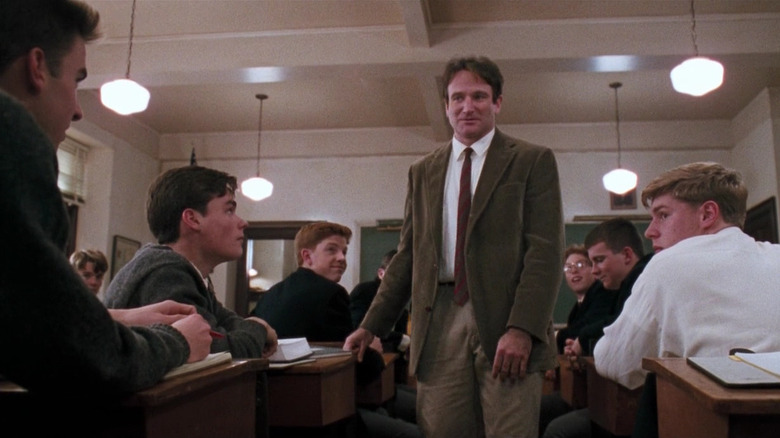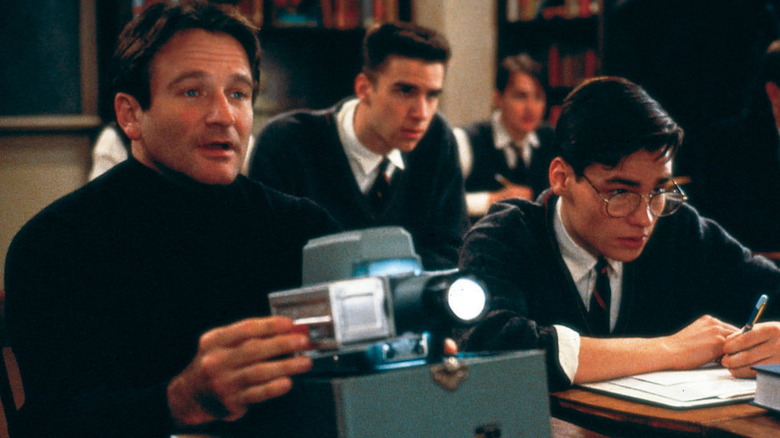Robin Williams Had To Hide One Of Dead Poets Society's Best Scenes From Disney
Fights between directors and studios are certainly nothing new to Hollywood. One way to avoid them is the approach taken by director Peter Weir in 1989's "Dead Poets Society." He opted to ask for forgiveness rather than permission to capture one of the film's best improvised scenes.
"Dead Poets Society" tells the story of John Keating, an unconventional English teacher at the buttoned-up Welton Academy, doing everything he can to inspire his students using poetry. His unorthodox methods and a student tragedy lead to his dismissal from the school, but not before several students display their defiant reverence for him with the famous line, "O Captain! My Captain!"
Robin Williams was a surprise choice for the role of the enthusiastic Keating. Williams was known for his work in comedy and at the time his Oscar-nominated performance in "Good Morning, Vietnam" two years prior was the closest thing to drama in Williams' filmography.
Despite the dramatic nature of the film, Weir went to great lengths to allow Williams' comedic side to shine, knowing it would translate to cinematic brilliance, even if it meant lying to the studio.
They hid a half-day of shooting from the studio
Weir was dealing with multiple challenges when it came to incorporating Williams' comedy genius into "Dead Poets Society." The costly film had a strict shooting schedule, and Weir had a young, inexperienced cast playing opposite Williams.
In an interview with Scriptmag, Weir explained why he was hesitant to encourage Williams' to use his comedy improvisation skills. He was worried that he would have the entire cast constantly laughing. Weir's solution was to give Williams an afternoon to let loose. Weir explained:
"I planned a half-day unscheduled shoot where I let Robin do his thing. We completely concealed this from Disney's front office ... we set up three cameras in the corners of the room, and I told the boys, 'Robin's coming in after lunch to do a scene that isn't in the script. Just remember he's still your teacher, Mr. Keating, and you'll wreck the scene if you laugh like you're watching a standup comic. So act amused, but don't overdo it.'"
The shoot was where Williams impersonated John Wayne and Marlon Brando, which made it into the film.
They came up with a plan to tone down the humor
Robin Williams spent the prior decade mastering comedy and wanted to branch out to more dramatic roles. Williams and Weir worked together to not "bury his gift," as Weir put it. He described it as a matter of scale and turning down the volume when it came to the actor's humor. Weir says they started with Williams' first moment on screen:
"We decided to set the tone when we first meet him in the assembly hall when the headmaster introduces him as the replacement English teacher. I had Robin simply raise an eyebrow, to symbolize that he could do small things that would still get laughs."
The plan worked, as "Dead Poets Society" resulted in Williams' second Oscar nomination for Best Actor and kickstarted his foray into dramatic roles. Williams didn't waste any time, starring in "Awakenings" the following year where he was nominated for a Golden Globe for Best Actor in a Motion Picture Drama. He would continue to swap between comedic and dramatic roles for the remainder of his career. He also left a lasting impact on the field of voice acting.
And it all started with Peter Weir's willingness to use a comedic actor in a dramatic role and his bold plan to hide a day of shooting from Disney to capture a classic improvised scene.


